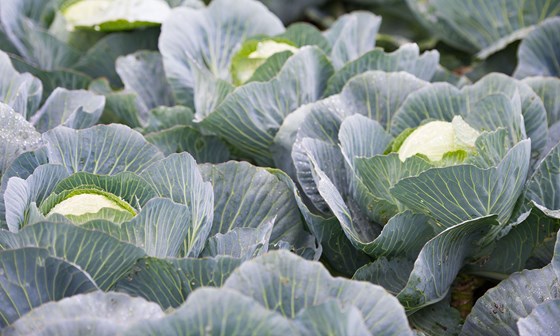News from the Field - April 2017
I’ve spent this morning walking the fields, monitoring the progress of our crops, and checking how wet the ground is (for the record, it’s pretty wet!)

As soon as we can get the machinery into the fields without causing a mess, we’ll be out with the fertiliser spreader and the sprayer. As well as applying the nutrients the plants need, we need to combat the diseases in the soil that are around this year thanks to the warm winter we’ve had. We also need to stop the cereals growing too tall because otherwise the plants fall over (‘lodge’) and then the combine harvester can’t gather the grains at harvest time – it has to be waving in the breeze!
Cabbage planting is well underway and last year’s leftover brassica stalks and out of specification plants have been rotavated into the ground, providing valuable green manure. I expect there’s around 15 per cent of this type of crop that is typically left behind as it doesn’t meet buyer’s specifications. It’s a ‘food waste’ problem that the industry is trying hard to address and you’ve probably seen ‘wonky veg’ in your local supermarket. By buying this you are letting supermarkets know that you are happy to accept less uniform-shaped vegetables which, in turn, increases opportunities for growers, so don’t be afraid to try them!
The restoration of the old sand and gravel quarry in Methley is on track for completion very soon too. As you can imagine, a project like this is very carefully regulated and we have a very detailed restoration plan to adhere to, drawn up with and overseen by the council planning authorities. The plan includes three lakes and well as woodland, hedges and grassed areas, the latter of which is due to be sown and ‘green’ by the summer. The tree planting programme details exactly where we need to plant each tree, however, a few weeks ago we found that around 100 trees had been planted on an area of the site, by someone other than the estate. While the intention inevitably must have been well meant, we have sadly had to remove these trees as they are not in line with the restoration plan we are working to. Do get in touch if you have any questions about these works and we will be happy to talk you through our work in this area.
Sticking with trees, we are delighted to once again be working with the Royal Forestry Society to host ‘Teaching Trees’ sessions with local primary schools. Our first two visits are with Oulton Primary School, where we’ll be teaching pupils to identify different tree species and work out how old a tree is, as well as educating them about the end uses of different types of wood and the wildlife habitats found in woodland areas and our christmas tree plantations. I wish we had gone on such exciting school trips in my day!
Martin Hodgson, Farm Manager